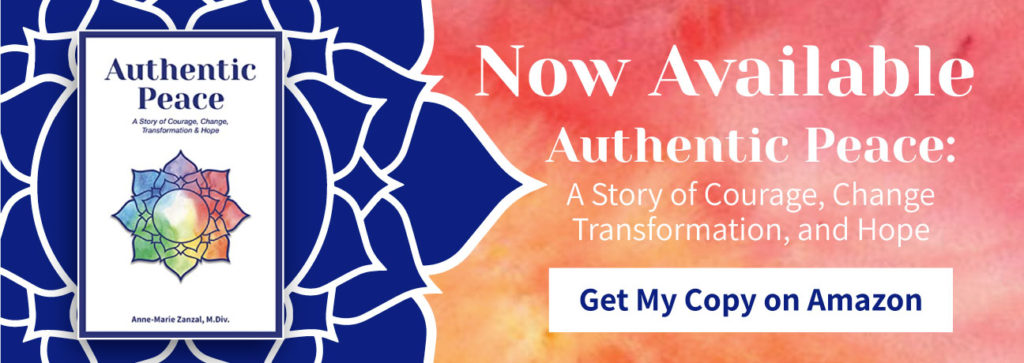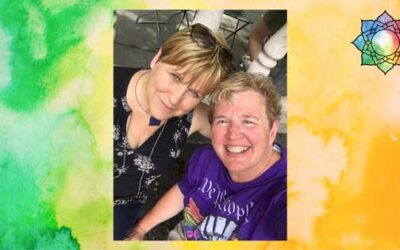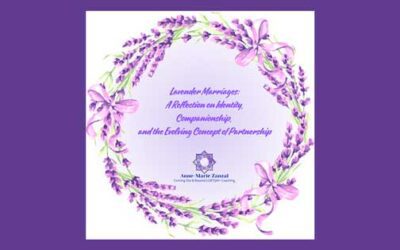Setting healthy boundaries and expectations is difficult for most people. Especially for those of us coming out later in life, it can be tricky to learn and more difficult to maintain. Many of us grew up in chaotic homes where we weren’t taught clear boundaries and our family relationships were enmeshed.
Even in seemingly healthy circumstances, children don’t always learn boundaries because our parents were ill-equipped to teach them and didn’t know how to enforce them themselves. As women, the expectations placed on us often involve having no healthy boundaries and sacrificing ourselves and our needs for the needs of others. Society pedestals this sacrifice and recognizing that we do actually have needs and boundaries can be a huge and heavy realization for us.
When we aren’t taught boundaries, many of us struggle with codependency, and setting boundaries become revolutionary in our lives. Some of us learn with AA or Al-Anon or work through it in therapy, but it’s always a process and it can be pretty hard.
Codependency is a learned behavior, often a type of relationship addiction. According to an interview with marriage and family therapist, Vicki Botnick, codependency “refers to any enmeshed relationship in which one person loses their sense of independence and believes they need to tend to someone else.”
It goes beyond people-pleasing and can be emotionally destructive or emotionally abusive. The goal here is to avoid that. As a learned behavior, codependency can also be unlearned. If you and/or your partner are super codependent, it’s a good idea to start with your own counselor and then work together.
Where to start setting healthy boundaries in a lesbian relationship?
1. I would recommend the book Codependent No More by Melody Beattie. It’s a great place to start and has helped a lot of us on our journeys to setting boundaries and understanding our own needs.
2. There is also a companion book to Codependent No More called The Language of Letting Go which is a daily book that just gives a reminder of boundary setting every day.
3. Start a meditation practice. Ge. There are many meditation apps on the market. I like Insight Timer. This app has hundreds of meditation for boundary setting, anxiety, fear, letting go, etc. Schedule time every day to listen to one meditation. If you find a favorite, it is ok to listen to it over and over again. When I was deciding to leave my marriage I practiced a “Letting Go” Meditation every single day. I didn’t sit in any special position, but rolled over in bed first thing in the morning and put it on. Then I just listened, sometimes I fell back to sleep, but I know it was planted in me to make the change I needed too.
4. Journal. This is one of the best ways to really get to know yourself and your needs and writing often helps process what has been stuck because it helps us find the words to understand it and move forward.
5. Some of us do not like to journal. A quick solution is the voice recorder on our phone. Capturing our thoughts and feelings is so helpful!
6. Make time for yourself. Your relationship with yourself is just as important as any other relationship. Give yourself time to understand your needs and feelings and process them and then set boundaries around what you need.
5. Practice making choices that empower you. Even if it’s as simple as enjoying that coffee that today, or saying no to something you don’t want to do. When we trust ourselves to make basic choices we can start a pattern of healthy decision making, which means we don’t have to have our partner make choices for us.
Healthy Reminders for Lesbian Relationships:
1. Be honest with yourself & your partner About things. The quickest way to negatively affect a relationship is to not speak up.
2. Ask for what you need. Neglecting yourself for the sake of someone else only leads to resentment and burnout. Let your partner know what you need and give them the opportunity to support you.
3. If you love your partner and 3-4 months in you’re struggling, seek professional support. If you want to maintain the relationship, work on it in the beginning, so you don’t get caught hooked into an unhealthy pattern. The best time to work on things is as soon as you notice them.
4. Don’t expect your partner to be the answer to your problems. You must have more support than just your partner. As humans, we do need each other and in a relationship, there should be a healthy level of interdependence where we consider each other’s needs and feelings.
One person can’t be everything to another and they shouldn’t be expected to be. Have your own friends and hobbies and your own support system beyond just your partner. Lean on them when you need to, but rely on others, too.
5. Our partners tend to be our best friends, but that doesn’t mean we have to tell them everything. There are things that we should get professional support for or the support of a friend instead.
For example, if you’re still attracted to your husband and don’t know why, don’t talk to your partner about that. At least not at first. Don’t look for things to stir the pot when you don’t need to. Thoughts are just thoughts and feelings that pass and a coach or therapist could help you work through the first and find the best course of action if sharing is ever necessary.
6. o. Respect when your partner says yes or no. Just as setting your own boundaries is important, respecting theirs is too. Although this may seem like a very small thing, my wife does not like documentaries. She says no to watching them, I don’t ask anymore. If I want to watch one I find some alone time to do so.
7. Don’t play games. Don’t try to make your partner jealous and don’t flirt with every woman in the room. Healthy relationships are built on honesty and trust. Communicate clearly if something is bothering you. Don’t punish them for it.
8. Sometimes it’s best to wait to talk about things if you are really angry. Get some space before you talk about it. When we are angry we say and do things that if we were in a calmer space we would never do. If you and your partner have a volatile relationship, take breaks with each other before an argument escalates. Give yourself room to process what you feel and think rationally about it. Come back together when talking will be productive.
9. Have a safe word if you are overwhelmed. It has to be something you both respect. It allows you to take a break and sort it out instead of taking it personally. It’s hard to do sometimes, but it’s healthy.
10. Remember this is a practice. Someday you will be tired and you will be a jerk or your wife will be a jerk. It’s a practice. It’s something to work on, to do every day. Setting and keeping boundaries is not a one time thing.
We may have different ways we approach practicing boundaries, but we focus on it daily. I am more controlling about it, I often tell my partner what to do. My wife, Tonda, is more anxious, and it shows up subconsciously with her. She likes to check in with me when I am away. She needs that security. I had to learn to recognize that she is checking in because she is anxious and that it’s not to control me. Communication and practice are what make that type of recognition and respect possible.
Setting healthy boundaries can be really overwhelming when you aren’t used to it. It’s difficult to know where to start and how to maintain them and sometimes it’s hard to know what you even need in the beginning. But remember that help is available, behavior can be changed, and communication can really help your relationship not only survive, but thrive.
While I am not a lesbian relationship expert, I do have experience from my own coming out journey. If you’re looking for support coming out later in life please reach out. I offer group coaching and workshops that can help you find community in this period of growth. We don’t have to do it alone. So many of us have been there and we want to help you on your way.
You can learn more about my own journey and discovery of what it means to come out later in life and have a healthy lesbian relationship in my book Authentic Peace.






